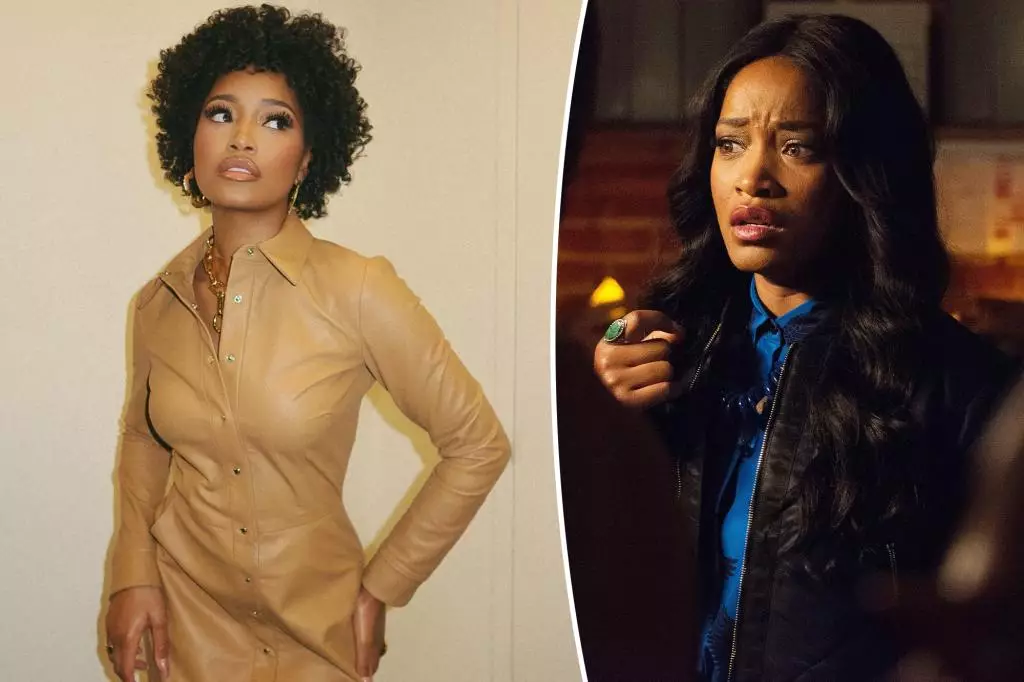Keke Palmer, the multifaceted actress known for her roles in “Nope” and “Hustlers,” recently raised eyebrows with a shocking claim regarding her time on the hit series “Scream Queens.” In her upcoming memoir, “Master of Me: The Secret to Controlling Your Narrative,” the 31-year-old actress recounts an unsettling incident involving what she describes as a racist remark made by a co-star, referred to in the book as “Brenda.” Palmer’s revelation spotlights the problematic dynamics often at play in the entertainment industry, especially related to race and power.
According to Palmer, the incident unfolded following a confrontation between “Brenda” and a colleague, which had escalated to a tense environment on set. Palmer’s effort to diffuse the negativity by suggesting a more respectful and fun atmosphere elicited a shocking response from her co-star, who dismissed her with the hurtful retort: “Keke, literally, just don’t. Who do you think you are? Martin F—king Luther King?” This comment not only reflects the palpable racial prejudice but also highlights the dismissive attitudes that marginalized voices often encounter in predominantly white spaces.
In a revealing interview with the Los Angeles Times, Palmer chose to keep Brenda’s identity under wraps, emphasizing her desire to strip away the power embedded in the co-star’s words. “It was such a weighted thing that she said, but I didn’t allow that weight to be projected on me, because I know who I am,” Palmer stated. Her assertive dismissal of victimhood is significant, as it showcases her resilience and refusal to let harmful words dictate her worth.
The broader implications of her experience echo the sentiments of numerous individuals in environments where systemic racism proliferates. The decision not to name the alleged perpetrator can also be viewed as a strategy to reclaim her narrative, asserting agency rather than submitting to a defining victim role that society often assigns to Black women.
Shortly after Palmer’s interview surfaced, fans took to social media, engaging in rampant speculation about the identity of “Brenda.” The social media discourse hinted that many believed the comment to have originated from Lea Michele, given the absence of a social media connection between Michele and Palmer. While fans dissected the timeline and interactions of the cast members, it exemplified how quickly rumors can proliferate in the age of digital communication, further emphasizing the intricacies of interpersonal relationships on set.
This online frenzy, fueled by public interest, reshapes how such allegations are received in the public realm, demonstrating the societal tendency to scrutinize and shift blame rather than focusing on the systemic issues at hand. It also raises pertinent questions about accountability in the industry, especially concerning how behavior on set is tolerated or ignored.
In addition to the alleged racist remark, Palmer also recounted a personal experience with Ryan Murphy, the co-creator of “Scream Queens.” In her memoir, she describes a tense confrontation where Murphy reacted sharply to her absence from filming due to another commitment. “I felt like I was in the dean’s office,” she reflected on the experience, which indicated the power dynamics that often dominate industry interactions.
While acknowledging Murphy’s focus on his business objectives, Palmer advocates for the idea that actors, too, are entities with their own professional aspirations and boundaries. This confrontation serves as a microcosm of the industry’s broader issue—where artists are sometimes pitted against the monopolistic spheres of powerful executives, leading to complex situations that force individuals to navigate their identity and career ambitions cautiously.
“Master of Me: The Secret to Controlling Your Narrative” is set to be released on November 19, giving Palmer a platform to further elaborate on her experiences and the lessons learned throughout her career. By sharing these deeply personal anecdotes, Palmer is not merely recounting her journey; she is challenging the very systems that have perpetuated racism and silence in the industry.
Through her memoir, Keke Palmer sends a clarion call for accountability and encourages others to embrace their narratives—their truths—without fear of reprisal. Her story is one of empowerment, suggesting that storytelling can be a potent tool against injustice in an industry that often leaves marginalized voices unheard.


Leave a Reply